Repost from Te Herenga Waka Victoria University’s Website
Over the past fortnight, Labour’s Jacinda Ardern and National’s Judith Collins have faced off in two televised leaders’ debates. But how is the ‚Stardust vs the Crusher‘ duel going on social media? Who is posting more? How are their followers reacting to their posts? Which topics do they focus on? How informative are their campaigns? And how ugly does it really get between New Zealand’s two candidates for Prime Minister on social media? Are we seeing the beginning of a ‘dirty campaign’?
In their content analysis study of social media, Professor Jack Vowles and Dr Mona Krewel from Te Herenga Waka—Victoria University of Wellington’s Political Science and International Relations programme have coded and analysed 599 Facebook posts placed by political parties and their leaders for 17-24 September, and will continue to do so over the coming weeks until election day on 17 October. The parties covered are Labour, National, the Greens, New Zealand First, ACT, The Opportunities Party, the Māori Party, the New Conservatives, and Advance New Zealand.
“Of those 599 Facebook posts from the first week of the four-week campaign, 51 came from Jacinda Ardern or Judith Collins. We look at these posts in our first analyses. We do stress that the number of posts from only one week of data collection of course is still very small. In the coming weeks, we will be able to get a much clearer picture of how the candidates are campaigning after we have analysed more posts and our data set has grown,“ says Professor Vowles.
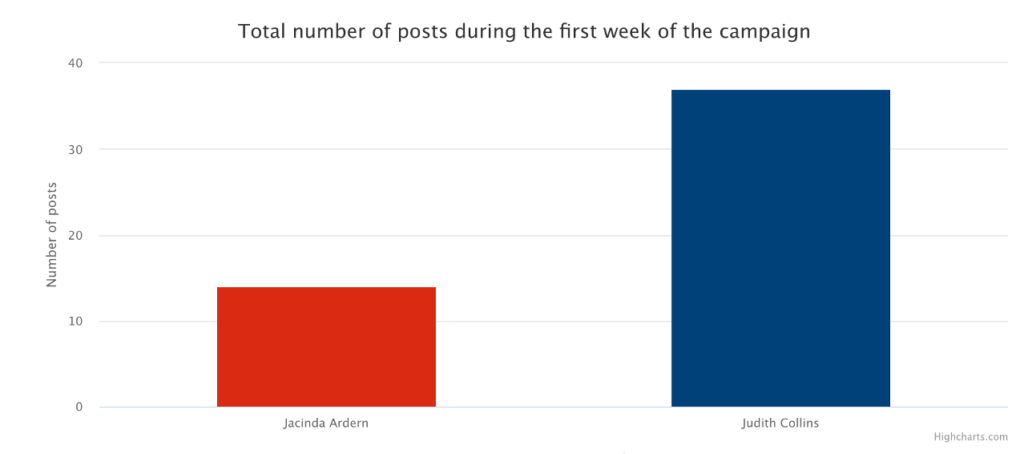
Dr Krewel says: “If we just look at the sheer number of posts, we see Judith Collins has posted more than twice as much as Jacinda Ardern. This might come as surprise to some, as Jacinda Ardern is seen as New Zealand’s social media powerhouse. However, this is not a surprise for political communication scholars.
“The literature classifies all communication by parties and candidates themselves as ‘paid media’. Research has shown challenger candidates such as Judith Collins use all forms of ‘paid media’ more than incumbent candidates. They invest more in television advertisements and in social media for the simple reason they need to level the playing field, because incumbents such as Jacinda Ardern automatically get more ‘free media’ or ordinary journalistic coverage. We call this an incumbent bonus. Given this, it is natural Judith Collins posts to reduce that bonus.“
Professor Vowles adds: “There is a big difference in followers between the two leaders. Jacinda Ardern currently counts around 1.7 million followers and her Facebook page has nearly 1.4 million likes whereas Judith Collins only has 62,000K followers and 59,000 likes. Judith Collins is well advised to post more to increase her prominence and popularity.”
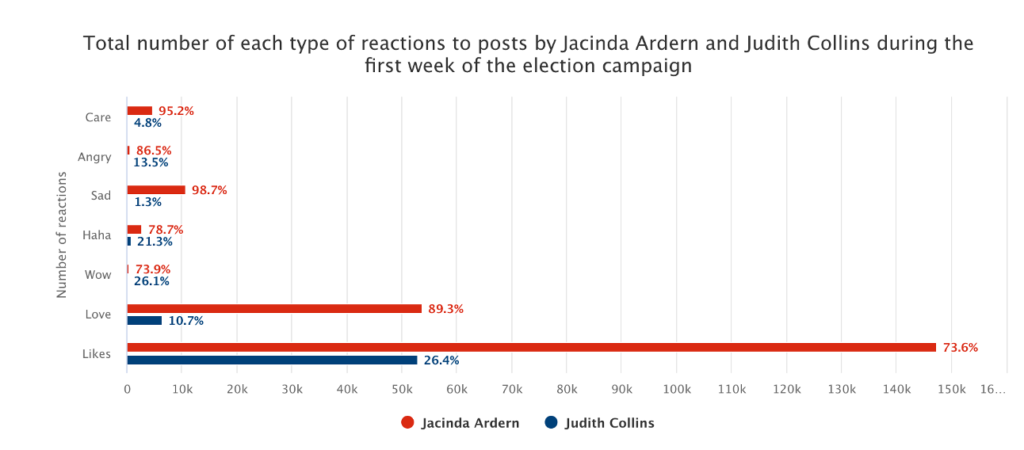
However, more posts do not automatically result in an advantage. So how have people reacted to the posts?
“First of all, in both cases, the answer is mostly positive. Most of the reactions both party leaders receive are likes and loves. The negative Facebook ‘angry’ emoji is used rather seldom. The reason for this is self-selection. Most of the people who follow a politician on social media do it because they like the person and want to support them and express their support publicly. Liking a politician on Facebook is a modern version of putting a sign into your garden to advertise the party and make clear where you are standing politically. The majority of the people who see most of Jacinda Ardern’s and Judith Collins’s posts are Labour and National partisans who support them and their work and express this with a positive emoji,” says Professor Vowles.
But who is doing better? “Here Jacinda Ardern clearly has an advantage. She has around three quarters of all likes, whereas Judith Collins only receives about one quarter. This picture is even more extreme when we look at the loves. However, Judith Collins also receives much fewer ‘sad’ and ‘angry’ reactions than Jacinda Ardern,” says Professor Vowles.
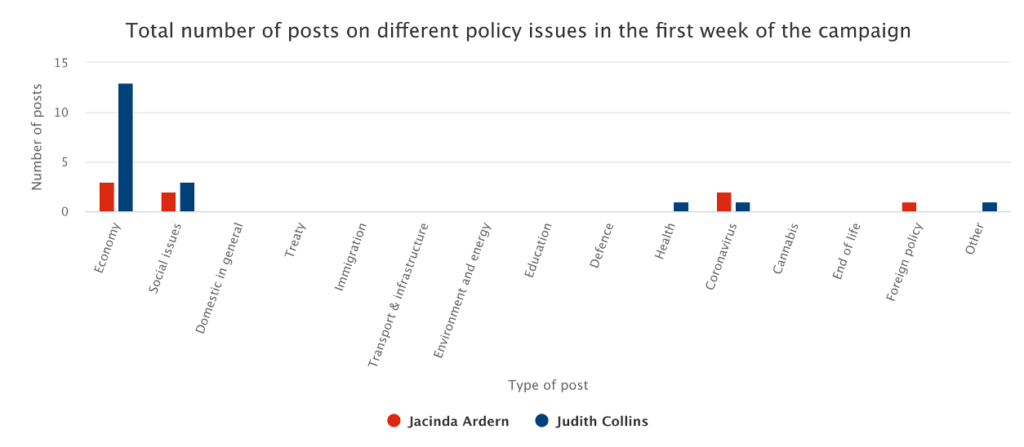
Looking at the topics on which both candidates focused in the first week of the so-called ‘hot campaign’, the graph above shows the most frequent topics in Jacinda Ardern’s and Judith Collins’s social media posts.
“The economy dominates the social media campaigns of both leaders,” says Dr Krewel. “This is not surprising, as not only in the times of COVID-19 but also in other times the economy is always the most important topic in every campaign around the world. Similarly, voters’ survey responses regularly show they believe the economy is the most important topic. To put it in the words of United States President Bill Clinton’s campaign manager James Carville: ‘It’s the economy, stupid.’”
“Besides that,” says Professor Vowles, “both candidates focus on social issues and—surely a result of the COVID-19 crisis—health in general and COVID-19 in particular.”
However, looking more closely at the most important topics in the graph below, one can note that Judith Collins focuses her campaign more on the economy than Jacinda Ardern.
“This is because voters who focus on the economy tend to believe National is more competent at governing the economy than Labour: indeed, this is true for most economy-focused voters around the world, who tend to favour conservative parties. Judith Collins is therefore emphasising a traditional strength of her party,” says Professor Vowles.
According to Dr Krewel, it is more surprising Judith Collins also focuses more strongly on social issues than Jacinda Ardern. “Competence and commitment to social issues are more characteristic of social democratic or Labour parties around the world. Jacinda Ardern might be well advised to bring that strength of her party to the forefront of her campaign.
“Nonetheless, the weaker emphasis on social policy in Jacinda Ardern’s campaign compared with Judith Collins’s can be explained. As New Zealand’s Prime Minister, Jacinda Ardern has been busy fighting the COVID-19 pandemic. Consequently, her Facebook posts focus more on COVID-19 than Judith Collins’s posts as the leader of the Opposition. As the Prime Minister’s response to the pandemic has been applauded in New Zealand and around the world, it is a smart campaign strategy to focus on that topic.”
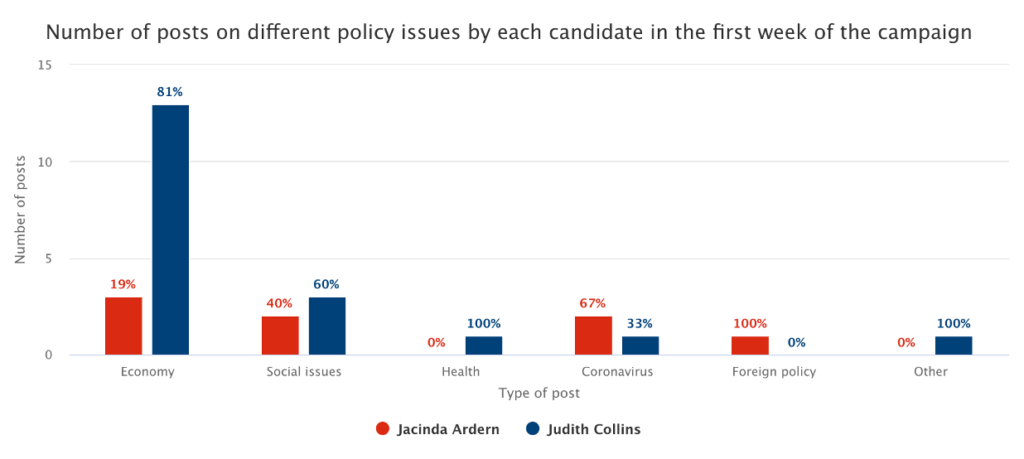
Not all topics brought to the fore in election campaigns are political.
“Social media demands a more informal style of political communication from politicians than traditional media. We very often also see politicians posting on non-political matters and giving us a glimpse of their private lives. This helps them to appear more human and more likeable,” says Dr Krewel.
Professor Vowles points out: “Thirty-six percent of Jacinda Ardern’s posts turn out to be non-political, compared with only 22 percent of Judith Collins’s posts. Compared with the first television debate, during which Judith Collins stressed her personal experiences and her own life much more than Jacinda Ardern, on social media Jacinda Ardern has made up for that omission and has spoken about non-political topics.”
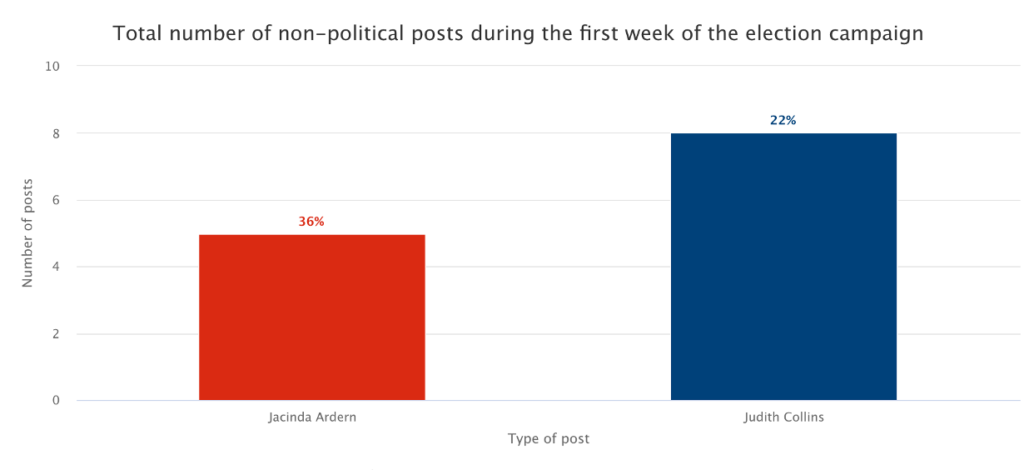
How informative are the leaders in their posts? “The normative democratic ideal of an election campaign is it should inform voters. Many justify the increasing use of social media in politics by claiming it helps voters to become more informed,” says Professor Vowles.
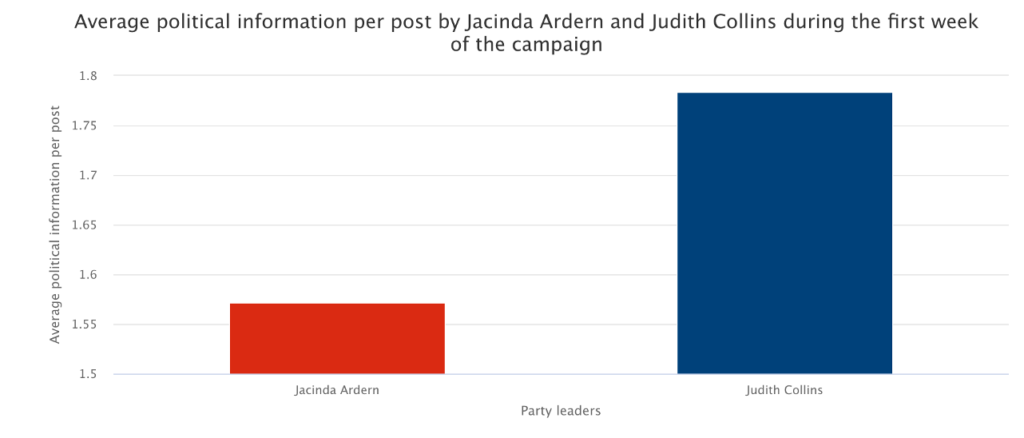
“On average, Judith Collins’s posts contain more political information than those of Jacinda Ardern. This makes sense, as Judith Collins still has to promote her policies, whereas Jacinda Ardern has been governing for four years and people know her record. Jacinda Ardern’s national and international popularity is very high, which means she can also campaign on her personality given her sky-high ratings. Judith Collins still has to convince people on the basis of her arguments as well as her personality.”
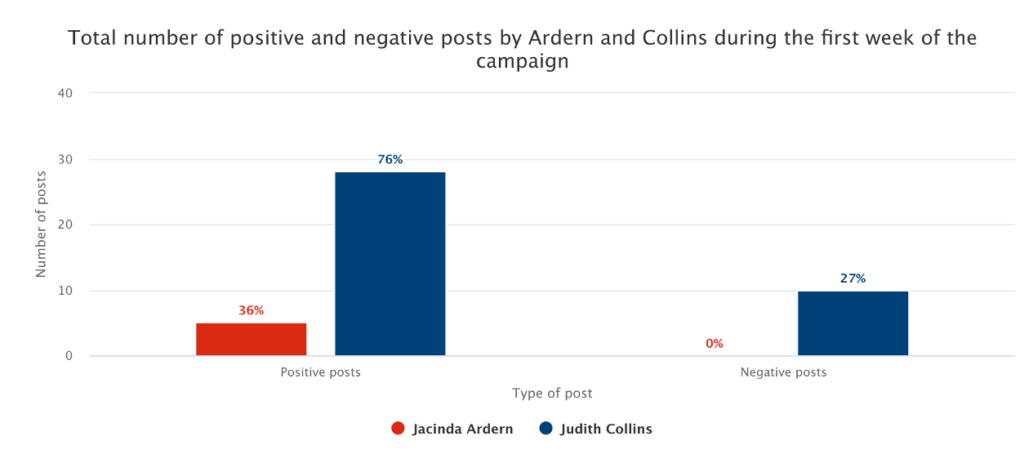
Finally, how negative were the posts made by the two leaders in the first week of the campaign?
According to Dr Krewel, Jacinda Ardern, at least on Facebook, seems to have kept her promise of avoiding negative campaigning, whereas Judith Collins has already gone negative and is living up to her reputation of being the “Crusher”.
“From a strategic standpoint, it makes sense for Jacinda Ardern to stay away from any dirty campaign techniques and not to attack Judith Collins personally,” says Dr Krewel. “Negative campaigning can backfire on the attacker. Currently, Jacinda Ardern is very popular and has a reputation for having a clean record. The chances she could damage her image by going negative are higher than any possible gains.
“Challenger candidates like Judith Collins are more dependent on journalistic media attention. Journalists and media editors are the gatekeepers who pick and select stories, making decisions at least partly based on news values. One important news value is negativity.”
To Professor Vowles, the targets of Judith Collins’s attacks also make a lot of sense: “Her negative posts mostly attack either Labour or the Government as a whole and—but to a lesser extent—the Green Party. Of course, Judith Collins must mainly focus on Labour, as the Labour Party is National’s biggest competitor. She also reinforces her followers’ beliefs that the Government has done a bad job and Jacinda Ardern and Labour need to be voted out of office.”
The most extreme version of negative campaigning is ‘fake news’—making up or misinterpreting evidence to make a claim that can be refuted by evidence.
“One clear example has appeared in our data, made by several National MPs but also by Judith Collins herself,” says Professor Vowles. “In this Facebook post, a selectively edited section from the first leaders’ debate is used to make it appear that Jacinda Ardern described a defence of dairy farming in general as ‘the view of a world that has past’. But in full context, Jacinda Ardern’s comment was about ‘dirty dairying’, the defence and practice of which she ascribed to a minority of farmers.
“Jacinda Ardern went on to applaud farmers meeting the challenge of sustainability as ‘climate change warriors’. Indeed, in the debate itself she directly denied Judith Collins’s assertion that she had said farming was a ‘time of the past’. ‘No, it’s not,’ she replied. In this, we see our first clear example of ‘dirty campaigning’ by one of the two party leaders here.” (For the full exchange, see Newshub.)
Looking at these first results, Associate Professor Kate McMillan, Head of the Political Science and International Relations programme at Te Herenga Waka—Victoria University of Wellington, says: “This study of social media during Election 2020 will shine light on crucial information that is otherwise hidden in individuals’ private Facebook feeds: how the different parties and candidates are communicating with voters during the election campaign. This is incredibly important at a time we see growing awareness of and profound concern about Facebook’s role in elections around the world. The more visibility given to the social media strategies of all parties this election the better.”
Note: CrowdTangle, a public insights tool owned and operated by Facebook, has been used to collect the data on which this commentary is based. This sample has then been coded by five human coders on the basis of the CamforS/DigiWorld’s codebook.